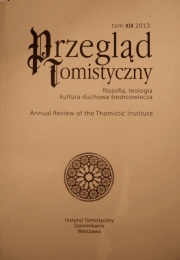Program kaznodziejski Wielkiego Jubileuszu 1826 roku w zaborze rosyjskim i w Rzeczypospolitej Krakowskiej
Preaching Programme of the Great Jubilee of 1826 in Poland, Under Russian Rule and in the Free City of Cracow
Author(s): Martyna DeszczyńskaSubject(s): Christian Theology and Religion, Theology and Religion, 19th Century
Published by: Instytut Tomistyczny
Summary/Abstract: This article concerns the ideological and theological programme of the papal Jubilee on the former Polish lands annexed by Russia and in the Free City of Cracow, the historical capital of Poland. the sources used here come from public and church archives and libraries, and the article refers to both Polish and international academic literature. The Jubilee Year of 1826 was an important event in the Catholic world, on which the concern of governments and monarchs from many countries was focused. The Jubilee inspired an intensification of pastoral work, affected the spiritual life of many people, and abetted Catholic unity in post-Enlightenment Europe, an environment in which the Holy Alliance was a crucial actor supported by official Russian ideology. Pope Leo XII announced jubilee celebrations for Rome and Italy in 1824, and act that, contrary to the popular belief, was opposed by his own advisors. Leo XII wanted sinners to return to the bosom of the Catholic church and to eliminate indifference and hostility to Catholicism in the aftermath of the age of Napoleon. the Jubilee was designed to help the church reach those who had become secularised under the influence of deism and atheism. Leo XII also wanted to bolster the standing of the Holy See as a social and political power. The papal bull Exultabat spiritus noster initiated jubilee celebrations in the Polish Kingdom and its captial, Warsaw. The political atmosphere there was tense in the wake of the Russian Decembrist uprising and various anti-Russian plots devised by patriotic Poles living in what was now an occupied country. The Russian authorities anticipated that jubilee ceremonies would pacify the local population. The Polish bishops, for their part, hoped that the Jubilee would strengthen Catholic orthodoxy, deepen belief, and also keep people from focusing their hopes on anti-Russian conspiracies. The civil authorities took part in preparing a formal schedule for the Jubilee, but the bishops and priests alone established the dogmatic and theological stipulations for this holy year. Church leaders wanted to avoid the influence of high-ranking government officials who had formerly been Freemasons and were therefore considered possible enemies of the church. The Jubilee was a chance to plan public prayers, acts of mercy, bell ringing, mass pilgrimages, and other of religious activities such as visiting specially-designated churches several times in a single day. The schedule of the Warsaw celebrations became the pattern for other dioceses in the Polish Kingdom. Jubilee preachers called for repentance, contrition, and reconciliation. Church elites invited friars and monks from various orders to help in leading services and prayers. The bishop of Lublin called for sinners to rejoice, stating that the grace of the Jubilee would be available to them as an aid to their full conversion. Many confessors were granted special authority to hear confessions of mortal sins, which was not common practice in this century. Numerous sermons were devoted to topics such as sorrow for sin, abuses of the sacrament of Holy Communion, the proper devotion to holy pictures and relics. One important motif was the compatibility of human reason with the faith. Priests frequently referred to Christian duties, appealed for religious zeal and the intensification of believers’ sacramental life, and promoted honesty in personal relationships and at work. Bishop J.P. Woronicz of Krakow, a poet and distinguished educator, stressed the link between religion in public life and national consciousness. Priests in Krakow, who were his subordinates, taught the Ten Commandments, warned against the profanation of the Name of God, and spread knowledge of indulgences, the sacraments, and the laws of marriage in practical application of the principles of moral theology. The jubilee of 1826 in the eastern region of the former Polish lands was organised without the explicit permission of the Holy See. Young people in Vilnius (Wilno, Vilna), for instance, were under close surveillance by civil authorities hostile to the church and could not organise open assemblies. Nevertheless, the friars of the Lithuanian Province of the Dominican Order were active in teaching throughout this year. They fought against the loss of faith, and denounced deism and Jacobinism. The priests tried to eliminate superstitions and bad habits, especially among the lower classes, while at the same time battling religious indifference among the upper classes. The Dominican J. Falkowski criticised the enlightened notions of liberty and equality, calling them dangerous to the social order. He juxtaposed the contemporary notion of liberty with reason and faith, which he saw as the proper principles for guiding one’s life. Many preachers alluded to the question of obedience to political power, which was usually presented, according to church tradition, as the moral duty of every believer. Usually, the contents of sermons and public speeches during the Jubilee were censored by church officials. Bishops ordered priests to read from printed homilies and avoid improvisation. Priests were exhorted to avoid presenting their private opinions as official church teaching. Jubilee liturgies and public ceremonies created a friendly climate for the mass renewal of religious practice, and prominent conversions and even public penances took place that year. Religious commitment increased in the region, and Catholic literary output (mainly books of homilies) boomed. These events powerfully strengthened the self-identification of the inhabitants of the former Polish lands as faithful members of the Catholic church.
Journal: Przegląd Tomistyczny
- Issue Year: 2013
- Issue No: XIX
- Page Range: 369-391
- Page Count: 23
- Language: Polish

